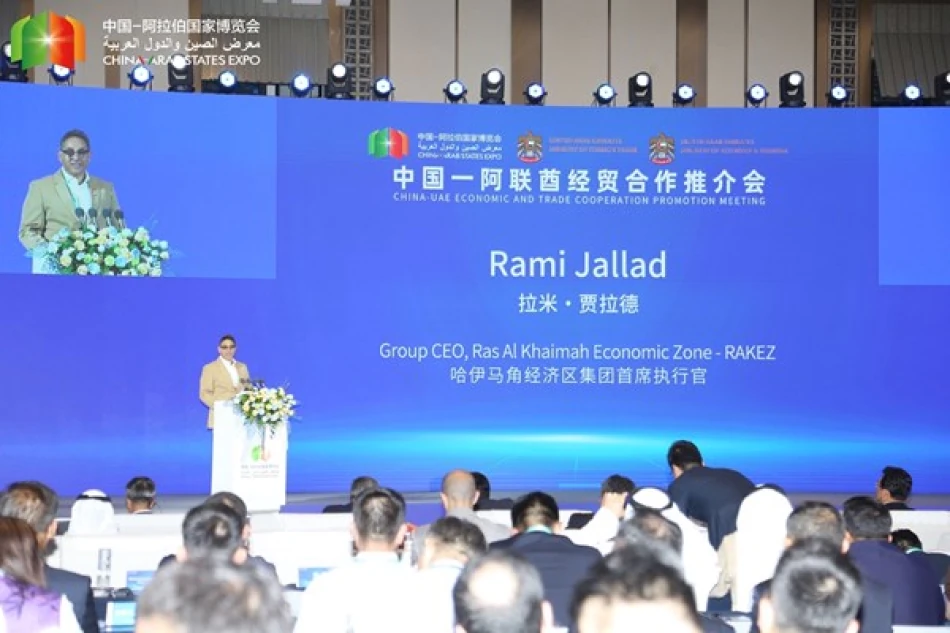
Chinese Technology Firm 'Rakz' Concludes Multi-City Tour, Exploring Expansion Opportunities
UAE's Ras Al Khaimah Doubles Down on China Strategy as Gulf States Pivot East
The Ras Al Khaimah Economic Zone (RAKEZ) has concluded a strategic tour across four major Chinese cities, signaling the UAE's continued commitment to deepening economic ties with Beijing despite shifting global trade dynamics. The delegation's focus on high-tech manufacturing sectors and institutional partnerships reflects a calculated bet on China's industrial capacity as Western markets face uncertainty.
Strategic Sectors Drive Investment Dialogue
Led by Group CEO Rami Jallad, the RAKEZ delegation visited Shenzhen, Ningxia, Xiamen, and Hangzhou, targeting sectors that align with both China's manufacturing strengths and the UAE's economic diversification goals. The meetings focused on smart electric vehicles, specialized furniture manufacturing, commercial drones, advanced construction materials, sophisticated packaging solutions, and high-value manufacturing industries.
This sector selection is particularly telling. Electric vehicles and drone technology represent China's emerging technological edge, while construction materials and packaging solutions offer immediate trade opportunities as the UAE continues its infrastructure boom ahead of major events and economic zone expansions.
Institutional Framework Takes Shape
The delegation's meetings with Longhua-Shenzhen government officials, the UAE Business Association in Guangdong Province, and China National Building Materials Group demonstrate a move beyond ad-hoc business relationships toward structured institutional cooperation. During the seventh China-Arab States Expo in Ningxia, Jallad emphasized the strategic integration potential between both sides, highlighting infrastructure capabilities and flexible services.
Numbers Tell the Story of Growing Ties
RAKEZ currently hosts over 300 Chinese companies across multiple sectors, operating within a broader business community of more than 35,000 companies spanning 50+ industries. These figures position Ras Al Khaimah as a significant hub for Chinese business operations targeting Middle Eastern and broader regional markets.
The economic zone maintains strategic partnerships with eight major Chinese regions, including Tianjin, Shenzhen (Longhua), and Wenzhou. This network approach mirrors successful models used by Singapore and other regional trading hubs, creating multiple entry points for Chinese investment while spreading risk across different provincial economies.
Belt and Road Integration Accelerates
RAKEZ's commercial sector head Anas Hijjawi participated in the Maritime Silk Road International Cooperation Forum, part of the China International Fair for Investment and Trade. This participation underscores the UAE's positioning within China's Belt and Road Initiative, leveraging its geographic advantage as a gateway between East and West.
Market Implications and Regional Competition
This deepening cooperation comes as Gulf states increasingly hedge their economic strategies between traditional Western partnerships and growing Asian markets. While Saudi Arabia pursues its own China initiatives through NEOM and industrial partnerships, and Qatar strengthens ties through energy deals, the UAE's approach through specialized economic zones offers a different model focused on manufacturing and trade facilitation.
For international investors and traders, RAKEZ's expanding Chinese network creates new supply chain possibilities and market access routes. The focus on high-tech manufacturing sectors suggests opportunities in emerging technologies, while traditional industries like construction materials benefit from the UAE's continued infrastructure development.
Long-term Institutional Mechanisms
The establishment of long-term institutional communication mechanisms between RAKEZ and Chinese partners represents a maturation of bilateral economic relations. This framework approach reduces transaction costs for businesses and provides predictable pathways for future collaboration, essential factors for sustained industrial cooperation.
As global trade patterns continue evolving, the UAE's systematic approach to China engagement through specialized economic zones may serve as a template for other regional economies seeking to balance diverse international partnerships while capturing growth in Asian markets.
Most Viewed News

 Layla Al Mansoori
Layla Al Mansoori






